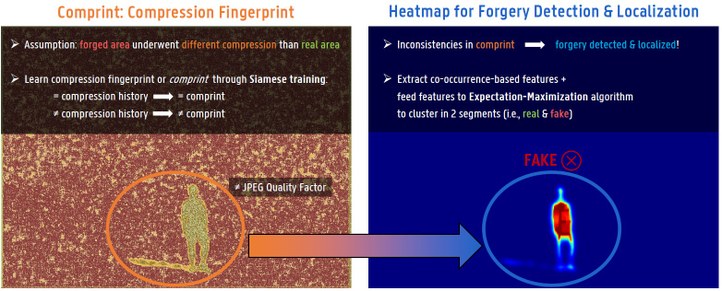COM-PRESS: Detection tool for manipulated images
- Visual forensics
- Fact-checking
- Combatting disinformation
Project overview
Disinformation and misinformation is a growing problem for our society since the rise of social media. Images are spread and viewed at a rapid pace, without guarantees on their authenticity. To address this, independent news media conduct fact-checks in which they check and refute viral messages. Despite news organisations’ vast baggage of experience and knowledge, detecting manipulations made with sophisticated techniques is extremely difficult.
The COM-PRESS research project will develop detection methods that journalists can use to detect and debunk image manipulations. It investigates new, promising techniques that look deeper than what can be seen with the naked eye (e.g., at the compression history). The COM-PRESS consortium will further explore these techniques in fundamental research, while bridging the gap to socially relevant use cases.

- Image by Hannes Mareen from IDLab-Media
Specifically, COM-PRESS works towards the following objectives:
- Investigating the credibility of existing manipulation techniques.
- Developing new detection methods of image manipulations, as well as searching for complementary detection methods.
- Opening up detection methods to journalists and evaluating them in concrete use cases.
In this way, COM-PRESS creates new insights in disinformation, in order to increase the resilience of citizens and journalists against disinformation.
Role of mict
Within COM-PRESS, imec-mict-UGent has three tasks.
- Our researchers will be contructing a literature review on manipulation techniques, enriched with expert interviews. The aim is to grasp the diversity of various manipulation techniques.
- Mict will set up an experimental design to measure the impact of manipulation techniques on how audiences assess news updates in term of reliabilty.
- We will investigate how the developed factchecking tool should be shaped and altered to fit news verification practices of journalists.
Project details
Researchers: Stephanie D'haeseleer, dr. Kristin Van Damme, prof. dr. Tom Evens
Partners: The research groups IDLab-MEDIA and imec-mict-UGent (both from UGent-imec) join forces with Apache (De Werktitel cv) as media partner. Moreover, the consortium is working with CheckFirst to build a dashboard.
Funding: Disinformation call by Flemish government’s Department of Culture, Youth & Media (Vlaanderen.be)
Duration: October 2022 to June 2024
Contact: dr. Kristin Van Damme
